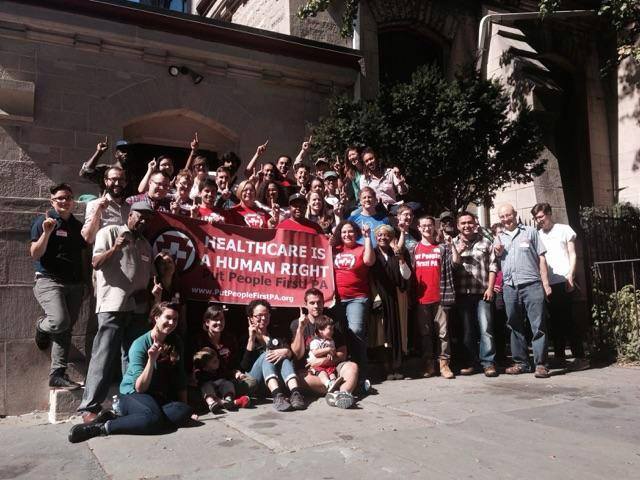On behalf of the Membership Assembly Planning Team we are so excited to have you at the Third Annual Put People First! PA Membership Assembly coming up on in York, PA at the Unitarian Universalist Congregation of York, 925 S. George St., 17403. All of the information in this e-mail can also be found on the PPF blog.
This Membership Assembly marks a major milestone for all of us and we are excited to celebrate it with you. Here are just some of the exciting things that have happened over the past year:
- We welcomed Sheila Quintana as the Field Organizer for Philadelphia and Southeast PA
- We launched the Fayette Health Justice Campaign working in partnership with the Human Rights Coalition and the Center for Coalfield Justice and travelled to Fayette, Washington and Greene counties on a statewide tour.
- We added a new team – the Political Education and Leadership Development Team
- We received funding support from the DentaQuest Foundation for our inclusion of oral health as part of the overall human right to health and our grassroots engagement strategy
- We participated in and supported the Mission of Mercy pop-up dental clinic in Harrisburg that served over 1,000 PA residents
- We launched a healthcare survey focused on rising healthcare costs, dental care, and access to care for undocumented people
- We hosted all of our statewide partners for a Healthcare Collaborative Convening in Philadelphia
- We had our first ever Organizing Institute in Lancaster
- We launched the Leadership Across Difference Project to train leadership that can unite people across our differences and undo oppressive conditioning
- We created the Campaign Advisory Board to bring together organizing committee members, partners, staff, coordinators, and team members to one strategy table
- We redesigned our website and updated our membership and dues system
- We conducted a statewide membership call each month to build relationships and engage in training and leadership development
- We conducted an analysis of the legislature matching relevant legislators and committees with districts where our members reside
- We knocked on hundreds of doors, tabled and visited with dozens of new people throughout Southeast, Central, and Southwest PA
Which brings us to the present! Here are 12 things you need to know about the assembly:
- Linked you’ll find two articles – one short and one long. Please read what you have time for.
- Also attached to this e-mail is the PPF Core Document which has information about our history and strategy.
- If you volunteered for any role/task at the assembly, a Coordinator will be following up with you. Please feel free to be in touch with them in advance as well. See below for Coordinators and contact information. Please bring instruments and games that we can enjoy together.
- Registration and breakfast begin at on Saturday and our assembly starts at 9 am. Please plan accordingly to arrive on time if you are coming in Saturday morning. If you are arriving on Sunday morning, please check in with your Organizer for details about where to meet the group. If you’re only coming for a day but need housing the night before, please get in touch with the housing coordinator ASAP. Drivers can be reimbursed for gas and tolls with receipts. Please bring the receipts with you.
- Childcare, food, transportation, and accommodations are provided. You’ll be receiving information about transportation and accommodations this week.
- Young people are welcome at the assembly! Childcare will be coordinated by trained providers with full background clearances. Please bring games and toys that your children enjoy.
- Everyone who needs a bed and closed door room to sleep in for any reason as well as elders and people with religious requirements will be provided one.
- We are following the food preferences that you provided in your registration form. Feel free to bring some of your own food items, there will be refrigerators and freezers at the Membership Assembly location as well as housing locations. We are providing breakfast, lunch and dinner on Saturday and breakfast and lunch on Sunday. We will be ending before dinnertime on Sunday
- What should you bring? a) Toiletries b) Sunscreen/bug spray if you feel that you need it – we will be spending some, but not a lot of time outside c) Air mattress/sleeping bag if you have it d) Paper/pen or device to write notes e) Your contribution to the assembly if you pledged one (cash preferred) f) games, toys, instruments, etc. g) festive and costume-wear (depicting sick people and people from various walks of life) for our street theater activity at the York Fair on Sunday morning – including fun/festive hats, suits/dress-up gear, work uniforms, graduation caps and gowns, crutches, slings and braces, etc.
- Our opening activity will be a spirit-building exercise “Who are you here for?” Reflect before the assembly on why you are a part of Put People First and why our work matters to you. During the opening go-round we will share with the group who we’re here for. This could be groups of people, people who live in a certain place or share a certain identity or experience, or specific people. The intention here is to ground ourselves in our lived realities and share with each other why this community and this movement matters to us. During the opening we will also be sharing our preferred gender pronoun, to acknowledge and respect the rights of our members to gender self-determination.
- We will be live-streaming the assembly. If you know of people who can’t make it but who have internet access and want to watch and listen in, please let us know.
- We have a shared playlist for the Membership Assembly on Spotify. If you’re on Spotify and you’d like us to share it with you or if you have ideas for tunes that are uplifting, powerful and speak to our values, let us know and we’ll add them to the list!
Here, again, are the readings for the Membership Assembly:
If you have questions about any of this: your housing/sleeping arrangements, food, childcare, etc, please email us at info@putpeoplefirstpa.org and we’ll connect you with the person coordinating that part of the Assembly.



